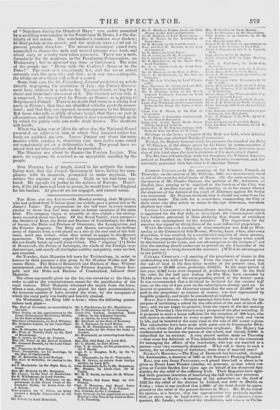The accounts received yesterday from Paris represent the state of
that capital as far from tranquil. "Grave disorders," says the Moniteur, "have been committed in the Fauxbourg St. Denis r and the correspondent of the Times, under the date of Wednes- day evening, states that not a night passes without tumultuous as- semblages of people, on the most frivolous pretexts. On Tuesday night, these assemblages had been more than usually numerous. In Paris, as sometimes happens in England, the zeal of the cham- pions of order is even more remarkable than that of the mob which they seek to regulate. On Monday, a man selling a history
of "Napoleon during the Hundred Days," was rudely assaulted by a meddling watchmaker in the Fauxbourg St.Denis, f( r the dis- loyalty of the action. The watchmaker's windows were broken ; he fired pistols at the crowd; and the military were cared out to prevent greater disorders. The mounted municipal guard were compelled to charge the mob, and several persons were hurt, and about sixty or seventy were taken prisoners. There was a mob, formidable for its numbers, in the Fauxbourg Poissonni6re, on Wednesday ; but no mischief was done or threatened. The cries of the people are "Down with the Clarlists Success to the Poles !" The weather is exceedingly hit, and the lower orders naturally seek the open air ; and thus, as in our own metropolis, the lifting up of a finger will collect a crowd.
Some time ago, the St. Petersburg Journal contained an article directly impugning the revolution of July : the French Govern- ment have addressed a note to the Russian Cana, caring for a direct and immediate disavowal of it. The Russian article will, it is supposed, be represented by Pozzo DI BORGO as auplying to Belgium and Poland. There is no doubt that there is a strong war party in France ; that they are identified with the parlidu mauve- ment ; and that they are opposed, in consequence, to the Ministry. But those who talk so glibly of crises forget, that these are rare in all countries, and that in France there is now a constitutional mode by which the public voice can make itself known. The elections will decide.
When the King was at Metz the other day, the National Guard presented an address to him, in which they touched rather too freely on political maters. Louis PHILIP cut short the com- mander while reading it, observing that men under arms could not consistently act as a deliberative body. The guard have re- solved that no other address shall be presented. The Ministry are about to dismiss the Foreign Legion. This must, we suppose, be received as an acceptable sacrifice by the people.



























 Previous page
Previous page